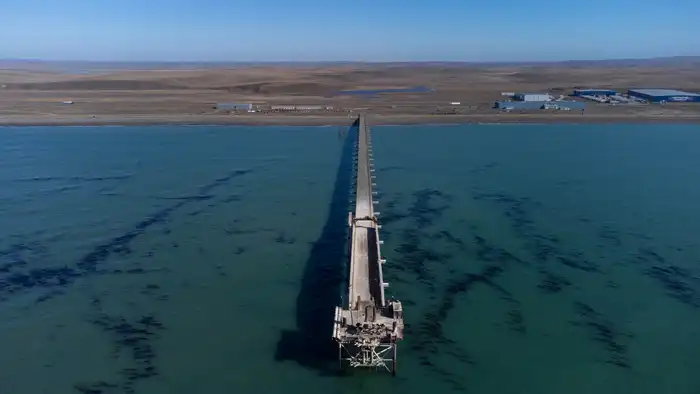
In the midst of discussions about China’s project to build a port in Tierra del Fuego, the United States called to “promote transparency and public review” of Beijing’s investments, and joined the calls for Chinese works to respect the laws.
Regarding the agreement between Tierra del Fuego and the Chinese state-owned Shaanxi Chemical Industry Group for the construction of a port, a power plant and a petrochemical plant in the southernmost point of the continent, a State Department spokesperson said that the US government is aware of Chinese efforts to invest in infrastructure in Latin America and the rest of the world, and recycled a list of warnings about Chinese works in the world.
“We are aware of the efforts of the People’s Republic of China to invest in infrastructure around the world, including in this hemisphere,” the spokesperson said. “We echo longstanding calls from Latin American capitals that PRC actions respect local laws and interests, provide transparency, respect human rights and workers’ rights, and protect the environment,” he said, then closed, “We encourage our hemispheric neighbors to promote transparency and public review of public projects, including PRC infrastructure investments.”
China’s advance in Latin America is a cause for concern in Washington, shared by Democrats and Republicans, and Argentina appears as one of the main regional epicenters of this concern. The close link between Beijing and Buenos Aires is a recurring theme in the talks of officials and politicians in Washington. The future of the Hidrovia, the 5G network, lithium, the development of critical infrastructure, the space station in Patagonia -to which the New York Times devoted an extensive article in 2018- or the purchase of fighter jets are corners in the country where the global bid between Washington and Beijing beats. To that list is now added the project to build a port in Ushuaia, a strategic point of connection between the Pacific and the Atlantic, about 1000 kilometers away from Antarctica.
The governor of Tierra del Fuego, Gustavo Melella, ratified the interest in the progress of the project a few days ago when he sent the provincial decree with the Memorandum of Understanding to the Legislature for discussion. The memorandum of the project, which contemplates an investment of around US$1250 million, states that the plan “will be exemplary for the investment of Chinese companies in the south of Argentina”. The memorandum is originally dated August 16, 2022, but Melella moved it only now, after the trip of the Minister of Economy, Sergio Massa, to China. Melella’s decision is framed in a context of growing expectations for China’s entry into a site considered strategic, at a time when the national government announced the construction of an Antarctic Logistics Pole, which will strengthen the role of the province of Tierra del Fuego as a gateway to Antarctica.
Melella denied in an interview with Bloomberg Linea that, at the moment, he needs any special approval for the agreements he signed with the Chinese company. “Nothing is needed. What was signed is a letter of understanding. It is a letter of good wishes, nothing more, what they want to do with each other. If we move forward, we would have to pass to a specific agreement and approvals. But today it does not need anything,” he said.
After Melella’s move, the national government lowered the tone of the plan, at a time when Massa seeks to close the negotiation with the International Monetary Fund (IMF). “He has no chance,” said a source from the Ministry of Economy. Another source from the Ministry of Transportation, headed by Diego Giuliano, said that the project is “not at all likely”, they remarked that a previous project already had a negative environmental opinion, and also that the place where the work is planned to be carried out is an international ecological reserve, which could not be used.
“If the project is analyzed, serious inconsistencies can be extracted from documentation presented a long time ago, which makes any possibility of progress impossible”, they stated in Transportation.
The US ambassador in Argentina, Marc Stanley, has closely followed the movements of the project in Argentina. Speaking about China’s advance, Stanley said that Washington needs to be more committed to the region, but at the same time admitted that the United States needs “more tools” to compete with China in Latin America, in an unusual public acknowledgement by an official of the advantage of the Asian giant, which is making multi-million investments in infrastructure in the region.
Stanley warned that China “wants to have more military presence” in Latin America. And he also said that they are concerned about the 5G network tender, which could be left in the hands of the giant Huawei, a fate that Washington believes would leave sensitive information circulating on the network in the hands of the Chinese government.
“In the future, wars won’t just be military, with missiles and weapons or whatever. Someone will come in and shut down your power grid, if you’re using fertilizer, they’ll put in too much or too little, or cause a problem with your nuclear plants,” Stanley said. “All of this could be very dangerous and it’s something we’re concerned about,” the ambassador warned.
“The Western Hemisphere is a demilitarized hemisphere. China would like to change that and have more military presence and control there. And if they put Chinese aircraft there, and other countries, Western countries have to become more defensive. We are creating a problem that is not there now,” Stanley added.
